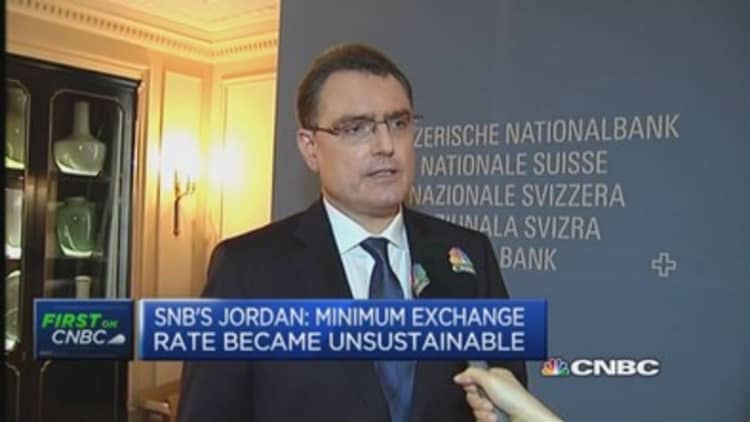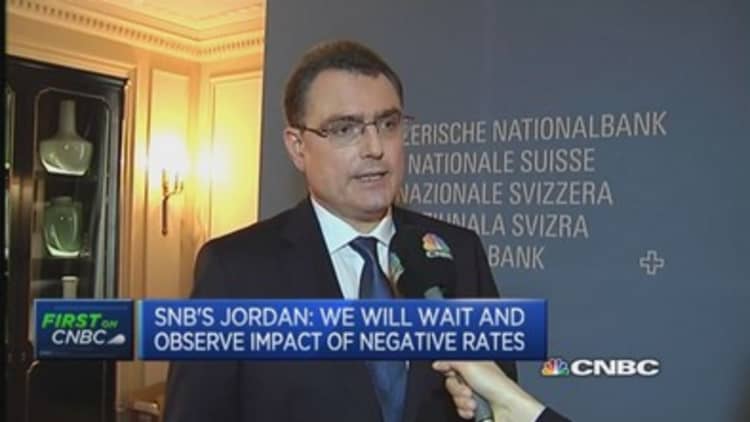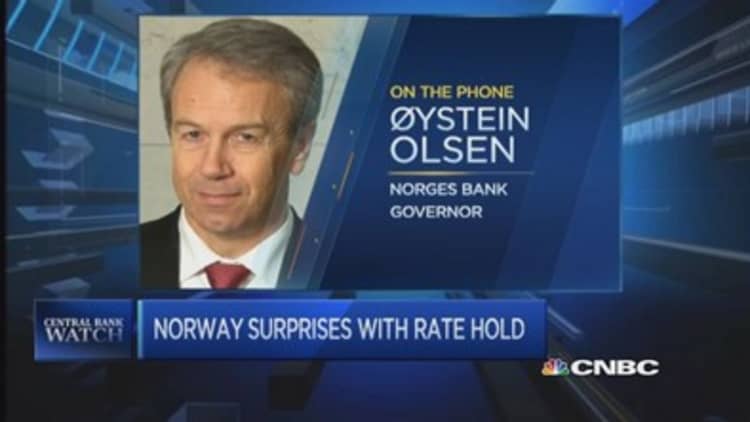

Switzerland's sudden axing of its exchange rate cap in January has not harmed the central bank's reputation, its chairman told CNBC on Thursday.
"I do not believe that our credibility suffered...The only decision that was right was to take the decision on January 15," Thomas Jordan said.
The Swiss National Bank (SNB) kept its monetary policy unchanged on Thursday, as expected, maintaining its easing bias and negative interest rates aimed at influencing investors not to hold large Swiss franc deposits. It held its benchmark interest rate at -0.75 percent and left the target rate for three-month Libor unchanged at between -1.25 percent and -0.25 percent.
The announcement came after the SNB stunned markets earlier this year when it suddenly ended a three-year-old currency cap that pegged the Swiss franc to the euro. In a chaotic few minutes after the announcement, the franc soared by around 30 percent in value against the euro and 25 percent against the U.S. dollar.
"Postponing the decision by a couple of months would have caused enormous intervention, with the potential for huge loss, without any impact on the Swiss economy and on Swiss firms," Jordan said on Thursday.
"We believe that credibility would have been harmed enormously if we had postponed and had to take the decision in the summer, with a huge increase in the balance sheet but exactly the same result."
Despite weakening in recent weeks, Jordan said in a statement on Thursday that the franc remained "significantly overvalued."
The currency rose against both the euro and the dollar on Thursday after the SNB said it was holding policy, reaching 1.0582 euros.

Jordan also warned that the inflation outlook in Switzerland had significantly declined.
"We have two shocks: one is the oil price and the other is the exchange rate, so it is very difficult to do something about that in the short-term," Jordan told CNBC.
"Inflation is lower than our target, but what we do not really see is the risk of a deflationary spiral."
The central bank cuts its 2015 inflation forecast to -1.1 percent from -0.1 percent, citing the sharp fall in oil prices, as well as the appreciation in the franc since the discontinuation of the minimum exchange rate.
Prices are seen continuing to fall until 2017, with inflation reaching a low point of -1.2 percent between July and September this year.
The SNB's decision to hold rates comes as the European Central Bank (ECB) and other smaller central banks in the region, such as the Swedish Riksbank, opt for further monetary easing.
"We suspect that the SNB would like to wait until the impact of the ECB QE can be better gauged before deciding on the need for further actions," said strategists led by Marc Chandler at Brown Brothers Harriman in a research note published after the SNB decision.
Krone slides on Norway surprise
The Norwegian central bank also opted to hold its key rate on Thursday, at 1.25 percent. This was unexpected, as most expected it to imitate the Swedish Riksbank, which cut rates by 15 basis points on Wednesday.
The Norwegian krone rose on the Norges Bank decision, trading over 2.5 percent higher against the euro and just under 1 percent against the dollar.
The central bank's governor, Oystein Olsen, said this move was expected.
"Given the developments in the krone exchange rate over the last few days, we were quite confident. We knew that the immediate reaction in the current market would be a strengthening in the krone, but from a quite weak level," he told CNBC on Thursday.
The central bank did leave the door open for further action however.
"If things come about just as we see it now there will be a further cut in the rate during the next three months," Olsen added.
Like the SNB, the Norges Bank cut its inflation forecasts for 2015-2017.
However, Olsen said there was little chance of the Norway's central bank introducing a negative repo rate (the rate at which the central bank lends to commercial banks), like its counterparts in Sweden, Switzerland and the euro zone.

"We are very far from considering that," he told CNBC.
"There is nothing in the state of our economy or the outlook that has triggered any thoughts of that kind of policy that some of neighbors have entered into."

